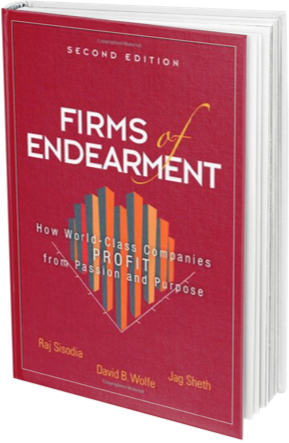Firms of Endearment Book Review

Firms of Endearment: How World-Class Companies Profit from Passion and Purpose
By: Rajendra S. Sisodia, Jagdish N. Sheth, and the Estate of David Wolfe
Pearson Education, Upper Saddle River, New Jersey – Copyright 2014
Review Written by Evelyn Neis
- This book shares the business practices of 28 companies (public and private) that have made a conscious choice to go beyond a shareholder/profit only focus to one that includes appreciating the relationship of their business to all its stakeholders equally.
- The authors show that the profits generated by the Firms of Endearment (FoE’s) stakeholder model generally outperform the shareholder-biased business model.
- The overview of interviews with people like Jeff Swartz-Timberland, Jim Sinegal-Costco, Herb Kelleher-Southwest Airlines, Kip Tindell-The Container Store, Ron Shaich-Panera and many more who share some of the steps they took to improve the leadership and culture of their companies will be inspiring.
The authors build a solid case that shows the 21st century requires a new way of thinking about business. FoE’s view their companies as economic ecosystems and in order to have a healthy ecosystem; the interests of all stakeholders must be met. They write about the need for companies to take a bigger role in making the world a better place. They provide examples of how companies have implemented changes which allowed them to evolve into being more humanistic organizations.
Many FoE’s have divested themselves of traditional marketing. Today’s technologies have changed many of the rules regarding how to market your business. Some FoE’s have substantially reduced the amount of money they spend on marketing and are very successful at attracting and maintaining a loyal customer base. These companies give their employees at all levels authorization to make many decisions on their own to resolve issues related to a customer’s dissatisfaction with a service or product. Example, “Southwest Airline flight attendants have been known to give an aggrieved passenger a free ticket.” The authors explain this type of trust is valuable to the organizations because “extraordinary confidence in employees causes them to perform extraordinarily.”
FoE’s often pay their employees more than “norms”. Former Costco CEO, Jim Sinegal states, “Paying your employees well is not only the right thing to do but it makes for good business. In the final analysis, you get what you pay for.” Mr. Sinegal believed, turnover is costly and time consuming for managers who spend their valuable time hiring and training replacements instead of focusing on the business. Happy employees can be your best ambassadors and will help in creating and retaining loyal customers. FoE companies attract the best people. “UPS has a multiyear waiting list of highly qualified drivers. Patagonia receives about 10,000 resumes annually to fill a hundred new openings.”
In the words of the authors, “This book is a clarion call for companies–indeed, organizations of every stripe–to reorganize and become vehicles of service to every stakeholder group. We offer a substantial volume of case-based evidence that companies that hew to a stakeholder relationship management (SRM) business model develop a distinctive and lasting competitive advantage and outperform their peers along multiple dimensions, including financial.”
Organizations that follow the model of the Firms of Endearment create emotional, spiritual, social, cultural, intellectual, ecological, and financial value to society as a whole. People who interact with these companies feel safe, secure, and fulfilled in their dealings. If your goal is to create or work for an organization like this, I recommend you read this book.
